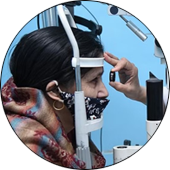- Email: Sushil_60@yahoo.com
- 4/15, sector -5, rajendra nagar
- Call: +91 98100 32030
Diabetes

20
Years of Experience in This Field
The Great Place Of New Vision Eye and Medical Care. Best Eye Care Clinic in Ghaziabad.
"The Great Place Of New Vision Eye and Medical Care" is the premier Eye Care Clinic in Ghaziabad, dedicated to providing top-notch medical and eye care services to the community. Our mission is to offer comprehensive, compassionate, and state-of-the-art eye care to improve the vision and overall well-being of our patients.
Our Mission
- High-quality work
- Innovation and Research
- Rapid response times
Our Vision
- Best Price
- Best Treatment
- Emergency solutions
What is The Main Reason for Diabetes?
The main reason for diabetes varies depending on the type of diabetes. There are primarily two main types of diabetes: Type 1 diabetes and Type 2 diabetes, each with its own underlying causes.
Type 1 Diabetes: This is an autoimmune disease where the immune system mistakenly attacks and destroys the insulin-producing beta cells in the pancreas. As a result, the body cannot produce insulin, leading to high blood sugar levels. The exact cause of Type 1 diabetes is not fully understood, but it is believed to involve a combination of genetic and environmental factors. It often develops in childhood or adolescence.
Type 2 Diabetes: This is the most common form of diabetes and is primarily associated with insulin resistance and relative insulin deficiency. The main risk factors for Type 2 diabetes include genetics, obesity, lack of physical activity, and poor diet. It often develops in adults, but it is increasingly being diagnosed in children and adolescents due to rising rates of obesity.
There are other, less common forms of diabetes, such as gestational diabetes, which occurs during pregnancy, and various forms of monogenic diabetes, which result from specific genetic mutations. These have their own unique causes.

In both Type 1 and Type 2 diabetes, high blood sugar levels can lead to a range of health complications if not properly managed, which is why early diagnosis and appropriate treatment are essential. Lifestyle factors, such as maintaining a healthy diet, regular exercise, and weight management, can play a significant role in the prevention and management of Type 2 diabetes. Additionally, people with diabetes often require medication, insulin therapy, or other treatments to help regulate their blood sugar levels.
A Global Leader, Treatment
of eye Disease

Heart Disease
Heart disease, also known as cardiovascular disease, refers to a group of conditions that affect the heart and blood vessels. It can encompass various disorders such as coronary artery disease, heart failure, arrhythmias, and valvular diseases.

Pediatric Ophthalmology
Pediatric ophthalmology is a medical specialty focused on the diagnosis and treatment of eye and vision problems in children, from infancy to adolescence.

Lenses Transitions
Transition lenses are a type of eyeglass lens that automatically adjusts their tint in response to changing light conditions. They darken when exposed to UV light and become clear indoors.
How it Helps You to
Keep Healthy

Get Appointment
+91 98100 32030

Start Check-Up
Begin Your Journey to Better Health Today: Start Your Check-Up!

Enjoy Healthy Life
Embrace Wellness: Enjoy a Healthier Life!
What are The 6 Symptoms of Diabetes?
Diabetes can manifest with a variety of symptoms, and the specific symptoms may vary depending on the type of diabetes and the individual. Here are six common symptoms often associated with diabetes:
1. Frequent Urination (Polyuria): People with diabetes, especially Type 2 diabetes, may notice that they need to urinate more frequently. This occurs because excess glucose in the bloodstream can lead to increased urine production.
2. Excessive Thirst (Polydipsia): Increased urination can lead to dehydration, which, in turn, may cause excessive thirst. This is the body's way of trying to compensate for fluid loss.
3. Unexplained Weight Loss: Individuals with diabetes, particularly Type 1 diabetes, may experience unexplained weight loss even when they are eating more than usual. This is because the body cannot properly use glucose for energy, so it starts breaking down fat and muscle for energy instead.
4. Increased Hunger (Polyphagia): Despite eating regularly, people with diabetes may feel extremely hungry. This is because the body's cells are not getting the energy they need due to insulin-related issues.

5. Fatigue: Diabetes can lead to feelings of constant fatigue and weakness, as the body's cells are not receiving enough glucose for energy.
6. Blurred Vision: High blood sugar levels can cause changes in the shape of the eye's lens, leading to blurred vision. This symptom is usually temporary and improves with proper diabetes management.
It's important to note that some people with diabetes, particularly in its early stages, may not experience noticeable symptoms. This is why regular health check-ups and blood glucose testing are essential, especially for individuals with risk factors such as a family history of diabetes, obesity, or a sedentary lifestyle. If you or someone you know is experiencing these symptoms, it is important to consult a healthcare professional for proper evaluation and diagnosis. Early diagnosis and management of diabetes are crucial for preventing complications.

